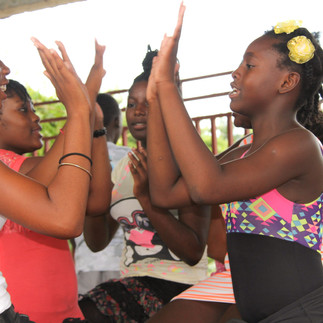June 12, 2021

In 2012 when myLIFEspeaks was first founded in Neply, Haiti we quickly came to understand, to our sadness, that there were many child slaves or “restavèks” in the area.
In Haiti, it is common for families who are extremely poor and cannot provide for their children to pawn their children out in domestic servitude under the promise that their child will have the ability to go to school, have food to eat, and have a so-called better LIFE and opportunity.
We can see a similar parallel to the “orphanage crisis” in Haiti, where desperate parents are misled to relinquish their children to for-profit orphanages under false promises of a “better life” for their children than they could provide at home. You can see the depth of this cycle and desperate need for family empowerment. These are two among many reasons why myLIFEspeaks focuses so heavily on empowering families and children, addressing the root of this bigger issue.
Washington, D.C.-based humanitarian organization, Free the Slaves, paints a bleak but realistic picture of this domestic servitude:
“Restavèk is a traditional system in which Haitian children from impoverished homes are sent by parents to live with other families and work for them as domestic servants. Ideally the child is enrolled in school by the host household and treated like one of the family. But often this does not happen. For many children, the day is filled with chores. Even the youngest are expected to fetch heavy buckets of water, hand-wash clothes, carry loads to and from the marketplace, and work in the fields—often laboring for 14 hours a day for no pay.”
Restavèk children are often treated as “lesser than”; reduced to a low status in society and in their households. They often sleep on the floor, have ragged clothes, eat leftovers, and oftentimes are beaten and sexually abused, especially young girls.
Free the Slaves goes on to explain that, “Successive generations have grown to adolescence in this atmosphere of shame, neglect, and abuse. Estimates of the number of children living in restavèk range from 150,000 to 300,000.”

When myLIFEspeaks’ launched in 2012 we quickly became aware of the need to empower children and teens who were at-risk of becoming indentured servants and their families, through meeting basic physical and spiritual needs. We knew that if the family was taken care of and parents knew they would be able to feed their children, they wouldn’t need to give them up. On the other end, we educate families who do have restavèks that child labor is morally wrong, in a gentle, culturally-respectful way.
As much as we as Americans can see child labor as a blatant wrong and humanitarian disgrace, in Haiti it is a normal part of culture and way of LIFE. We had to take the approach of not coming in and saying, “You’re wrong!” and “You can’t do this,” but to form relationships and empower them to see the truth in the light for themselves.
We also sought to personally empower the children who were restavèks and at-risk, to sustain them today while propelling them to a brighter tomorrow. Out of this need, myLIFEspeaks created Redemption 72:14, a Biblically-based educational and nutritional program. The 72:14 comes from the program’s foundational verse from the Book of Psalms: “He will rescue them from oppression and violence, for precious is their blood in his sight.”
Redemption 72:14 provides tutoring, mentorship, and intentional Christ-centered relationships for a brighter future for our commUNITY’s youth. Participants also benefit from learning LIFE skills like cooking and empowering activities such as music, dance, and sports.

Through myLIFEspeaks employment opportunities for parents, educational programs, and feeding programs, parents are no longer desperate to relinquish their children. When myLIFEspeaks began in Haiti, there were approximately 70 restavèk children in Neply. Today, there are approximately 50.
And although our goal is for that number to be zero, the majority of restavék children we do know in Neply today are now seen and treated as part of the family, not as slaves. The “restavèks” in Neply today are not on the same level of disparity as they once were or that commonly exists across Haiti. Although the ideal is for children to be in loving homes with their parents, we realize that in Haiti it is very common for children to live with aunts, uncles, cousins, or neighbors if their home life isn’t the best. This is a continual process of counter-cultural education and empowerment.

What once many years ago was a predominant issue has now, through intentional Christ-centered relationships and family empowerment, become an increasingly smaller one in our commUNITY. When the pandemic hit in 2020 we had to make major budget cuts to keep ministry afloat at a basic level. Naturally, Redemption 72:14 was one of the first to go. Now in 2021, upon re-assessing the needs of our commUNITY, we saw that by God’s Grace there is no longer a great need for this program in Neply anymore.
We continue to empower families and at-risk children and teens through educational, nutritional, and medical programming, further diminishing the number of and need for restavèks. Family has always been at the core of who we are. We will continue to fight and speak for those who cannot speak for themselves (Proverbs 31:8). We will never stop until every LIFE is seen and treated as the Image Bearer they are.














Comments